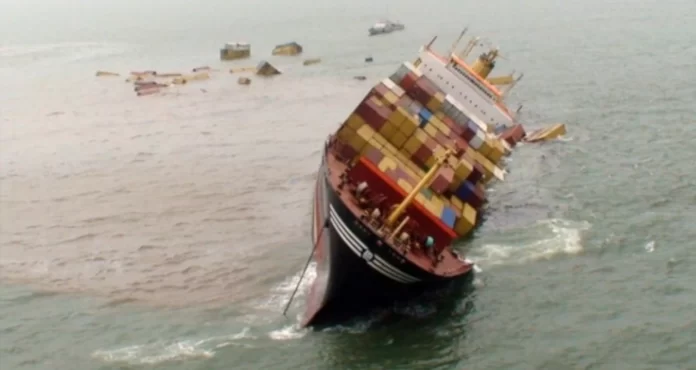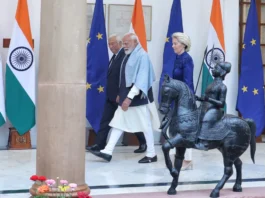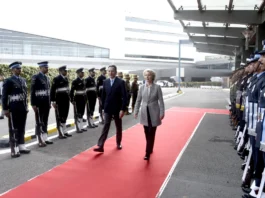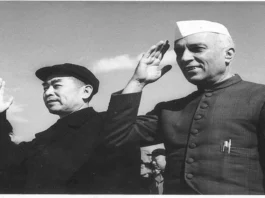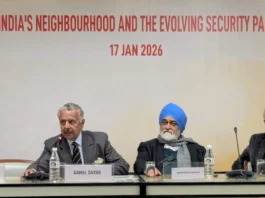On August 5, 2010, at 0950 hrs, Mediterranean Shipping Company’s (MSC) MV ‘Chitra,’ the outbound merchant vessel from Jawaharlal Nehru Port Trust (JNPT), collided with MV’ Khalijia –III’ when the latter was sailing towards Mumbai Port Trust (MBT) for berthing, about 10 km from the coast. While MV Chitra was registered in Panama, the MV Khalijia was registered in Saint Kitts. MSC Chitra was carrying 2,662 tonnes of oil, 288 tonnes of diesel, 88 tonnes of lubricants, and over 1200 containers. Nearly 300 containers had fallen into the sea after the ship tilted by 75 degrees by the evening of the accident. Thousands of barrels of fuel from collided MSC Chitra moved along the Mumbai coast, forcing authorities to close the busy port for six days.
Flags of Convenience
‘Flying flags of convenience’ is an extremely popular practice of registering merchant ships in a foreign state. If an Indian Company registers its vessel in India, the stringent Indian laws and standards govern it. It is basically done to reduce operating costs and avoid government regulations, or because of non-union labor laws, relaxed safety norms or lax taxation policies.’
According to the United Nations Conference on Trade and Development’s (UNCTD) latest Review of Maritime Transport (2009), out of 564 ships owned by Indian nationals, 69 ships (roughly 12%) had been registered in foreign states. Of these 69 Indian-owned ships registered in other states, 25 are registered in Panama alone.
The popular flags of convenience for Indian ship owners are Panama, Liberia, Singapore, Saint Kitts, and the Marshall Islands in the Pacific. Even some land-locked countries offer their flags to anyone who pays them a fee, and the ships are technically under the jurisdiction of the country whose flag they fly. Other than getting their due fees, such countries have hardly any interest in what happens to the vessel aboard halfway across the world! More than half of the world’s ships are registered with flags of convenience, and the UNCTD report says that Panamanian, Liberian, and Marshallese flags account for almost 40% of the world’s fleet in terms of dead weight tonnage.
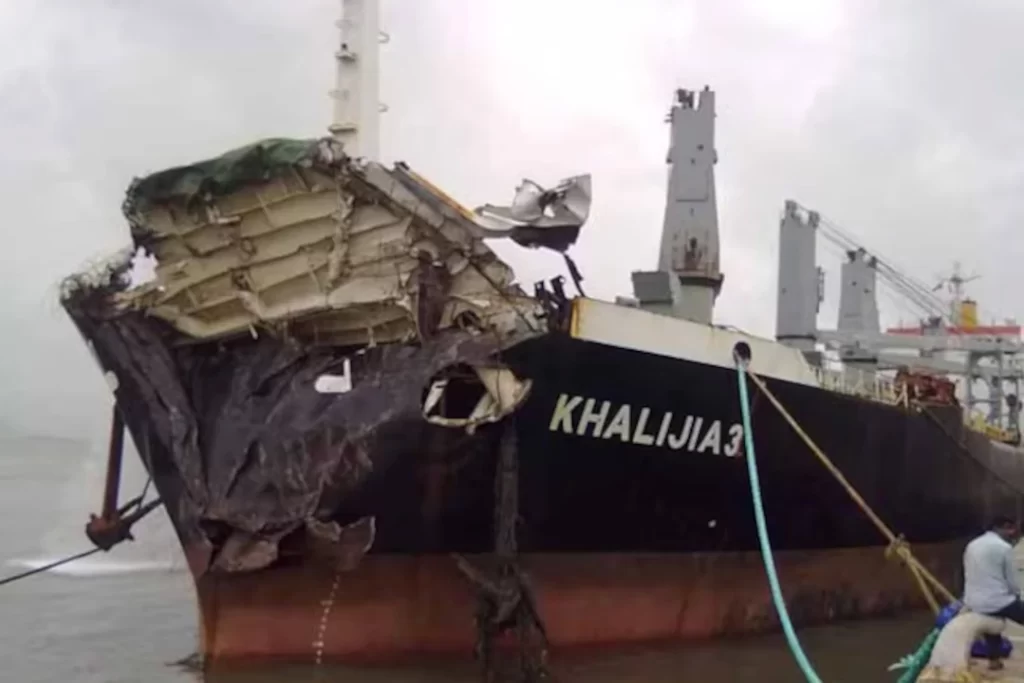
As per international maritime conventions, the laws of the flag state are used when an accident occurs on the high seas. But when an accident occurs within a nation’s territorial boundaries, such as in the case of the Mumbai collision, the affected state’s laws gain precedence. Thus, ship owners worldwide enjoy the freedom to choose the flag that best suits their commercial interests.
The Accident
On August 5, 2010, at 0940 hrs, MV Khalijia-III was entering JNPT’s Nhava Sheva port to offload oil and coal cargo. At the same time, MSC Chitra was leaving the Nhava Sheva port for Mundra port in Gujarat. It is believed that the Captain of the MV Khalijia had flashed a radio message to the port authorities on the very high frequency (VHF) set warning that its steering gear had failed and MV Chitra should change its course to avoid the accident, but there was no response. Some navigational experts have stated that the Duty Watch Officer of MV Chitra had put his VHF set on zero volume to avoid radio disturbances and, thus, failed to acknowledge the warning signal. It is also alleged that both the vessels were operating on different frequencies – Khalijia on VHF 12 and Chitra on VHF 13, violating the Standard Operating Procedures (SOPs) prescribed for communication between ships, port traffic controllers, and pilots escorting the ships. At 0945 hrs, moving in the same channel, the two vessels collided head-on near the Prongs Reef Lighthouse, about five nautical miles off the Mumbai coast. While Khalijia-III managed to dock at the JNPT after the collision, Chitra, facing maximum impact, started tilting by 15 degrees. The collision cut a deep gash through the hull of MSC Chitra.
By the evening of the accident, the ship tilted by 75 degrees, submerging some portion of it, was grounded and dropped more fuel and containers in the sea. Since the ship was stuck in a shallow rocky sea, risk of its sinking entirely was over ruled. A total of 33 crew members including the Captain of the MSC Chitra were rescued.
Over 300 containers of MV Chitra had fallen into the sea while 500 tonnes of fuel oil spewed into the sea that quickly spread towards the coast. Ship traffic was suspended as the containers that had fallen from Chitra were floating in the channel, making navigation hazardous. Apart from the huge financial losses, the Mumbai coast was braced with a serious environmental disaster adversely affecting the fragile marine ecosystem as the oil slick spread to three nautical miles around stuck MV Chitra, threatening tourist beaches in Alibaug, Kashid, Awas, and Murud.
The Indian Coast Guard (ICG) and the Indian Navy (IN) pressed five ships to contain the slick and prevent it from reaching the coast. Dornier aircraft and helicopters sprayed dispersants on the oil slick, and the help of the Bombay Natural History Society (BNHS) was sought to fight the oil spill. However, some Mumbai environmentalists believe that if the Coast Guard and Indian Navy had reacted faster, the damage could have been reduced. The Coast Guard also requested the State Chief Secretary to ‘restrict fishing off the coast.’
It is believed that about 31 containers on board the vessel were carrying hazardous chemicals, pesticides, and fertilizers, while the rest had milk and biscuits as cargo. Some of the cargo from the ship was found floating near the Gateway of India and recovered by street urchins. Securing fallen containers that had drifted as far as Raigad and other areas was an urgent task. Meanwhile, the MV Chitra owners had requisitioned services from experts in ship salvage from Singapore, who had submitted their report to the Coast Guard. The experts had suggested that the oil from the remaining tanks of the MV Chitra be emptied first using suction pumps, and after that, only removal of containers from the ship would begin. Weather permitting, the whole operation could take around two weeks to one month.
Spillover
The slick had spread over 100 km along the coast of Alibaug, Marva, Sewree, Thane, Raigad, Uran, and the Elephant Caves, besides Mumbai mangroves. All mangrove seeds in this stretch were totally destroyed. The oil slick adversely affected the rich marine life and ecology. Our ports do not have mechanism to contain such spills in the sea itself, so that the coast, mangroves and rocky crevices are protected.
Reports of oil contamination have come from Jawahar Dweep, a restricted area around 8.5 km away from the Gateway of India, more than 45 days after the oil spill from MV Chitra and the nodal agency for the clean-up operations, the Maharashtra Pollution Control Board (MPCB) was not informed. Jawahar Dweep is popularly known as Butcher Island. This came to light during the recent field visit of the MPCB and the International Tanker Owners Pollution Federation Limited (ITOPF). The Indian Institute of Technology (IIT) Mumbai has recently developed a chemical technology to clean sea oil silt and has offered help to MPCB for cleaning up the worst affected mangroves.
At least 31 containers with hazardous chemicals, including organo-phosphorous pesticide, sodium hydrochloride, and pyrethroid pesticide, falling into the sea would seriously contaminate seawater and marine life along the coast. The authorities at Jawahar Dweep have secured five containers, and the MSC has been informed.
The accident occurred during the spawning season. The Central Marine Fisheries Institute will have to survey contamination and destruction of fish populations. Fishermen were directed not to go fishing, thus shooting seafood prices up by 30-40%.
The Bhaba Atomic Research Centre (BARC) was asked not to use seawater for cooling purposes for its two research reactors Dhruva and Cirus.
Constable Ramesh Tukaram More died on August 9, 2010, after he fell off the boat patrolling near the cargo vessel MSC Chitra.
Aftermath
While entering or exiting the port, merchant ships are piloted by experienced master mariners specially trained in piloting ships who assist and advise captains of the ships in navigating to and fro the port. The investigating agency should question the pilots, captains, and Watch Officers of both vessels involved in the collision for any error in their piloting, navigational, and communication procedures. Some marine experts have said that the navigational channel is not marked with buoys, and the VTMS of the port is 30 years old and outdated.
The Mumbai police registered a case against the two ship captains for the collision that took in daylight and clear weather conditions. They could see each other and yet did not change course or slowed down. Both the captains of the ships involved in the accident were directed to appear before local officials to explain how the collision took place.
While the Director General of Shipping has ordered an inquiry, the Indian Government has clarified that the shipowners would be held accountable for the mishap, penalized for the environmental damages, and their insurers made to pay compensation to fishermen whose livelihood was affected.
Unlike Europe, the US, Australia, and other maritime nations, India does not have a dedicated Marine Accident Investigation Agency. Such independent agencies do not report to the Director General of Shipping or Coast Guard but instead report to the shipping ministry. Creating such an agency manned by qualified master mariners and marine engineers will go a long way in identifying lapses (possibly amongst ports, ships, pilots, watch officers, and communication procedures) and recommending steps to ward off such accidents in the future.
